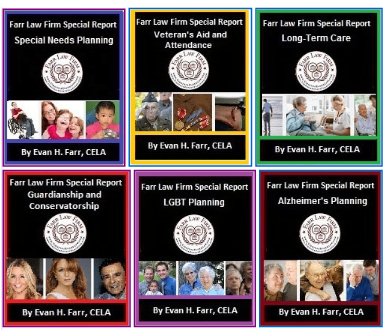Will Christmas Gifts Disqualify Grandma?
Published: Fri, 12/18/15
 |
Will Christmas Gifts Disqualify Grandma?If you cannot view the image below, please read the article on our blog. Q. My grandmother is really excited about Christmas this year. In the spirit of the season, she is considering making a truly meaningful gift of $5,000 to the local animal shelter, and giving another $5,000 to her church. She also told me that she will be giving my husband and me $2,000 for a backyard swing-set for our children, and my sister $2,000 to put towards her bathroom renovation. Although it's extremely generous of her, I am getting a little nervous about the sizeable charitable contributions she is considering and the gifts to my sister and me, because there is a strong possibility that she will need Medicaid in less than 5 years. Can she be disqualified because of her Christmas gifts and charitable giving? A. It is nice to hear that your grandmother is a generous person who wants to help you and your sister with such nice Christmas gifts, and give to her church and the local animal shelter. However, when it comes to Medicaid eligibility, your grandmother would likely be penalized for her generosity. Why? Gift giving can be a risky venture for people who may need Medicaid coverage within five years. This is because Medicaid presumes that all gifts made in the 5 years prior to filing for Medicaid were made in contemplation of applying for Medicaid. Individuals seeking eligibility for long-term care Medicaid benefits must disclose all gifts (whether these are charitable donations or gifts made to friends or family members) made by the individual or his or her spouse within the prior 5 years. Medicaid presumes that gifts made within 5 years of the eligibility request date were made in order to qualify for benefits. If someone has a history of giving small weekly or monthly gifts to a charity, most Medicaid offices will not construe those to be disqualifying gifts. For instance, in Virginia, these types of regular gifts are not penalized so long as they are under $4,000 per year and there was a regular pattern of making this gift for years prior to applying for Medicaid. But a sizeable one-time gift such as the ones you have mentioned will be penalized. Does this potential risk of a Medicaid penalty suggest that all giving should cease? Not necessarily. However, those who may need nursing home care within the next five to ten years must weigh the joy of giving against the potential cost of losing much-needed Medicaid benefits. For more information about gifting and Medicaid eligibility, read “Medicaid: The Perils of Gifting FAQ” on our website. Q. Also, I noticed you sent out the new key elder law numbers last week, but I did not see anything about gift and estate tax exclusion amounts for 2016. What are the new gift and estate tax exclusion numbers for 2016, and how do they compare to the current ones? If we do start making gifts, should we update our estate planning and, if so, how often? A. For 2016, the estate and gift tax exemption is $5.45 million per individual, up from $5.43 million in 2015. That means an individual can leave $5.45 million to heirs and pay no federal estate or gift tax. A married couple will be able to shield $10.9 million from federal estate and gift taxes. How does this compare to previous years? Under the provisions of the American Taxpayer Relief Act of 2012, the lifetime gift and estate tax exemption increased from $5,120,000 in 2012 to $5,250,000 in 2013 and the tax rate increased to 40%. In 2014 and future years, the exemption amount continued to be indexed for inflation and the tax rate remained at 40%. The 2014 lifetime gift tax exemption as indexed for inflation was $5,340,000, the 2015 lifetime gift tax exemption is $5,430,000 (an increase of $90,000), and the 2016 lifetime gift tax exemption is $5,450,000 per individual (an increase of $20,000). In 2015, you can gift up to $14,000 per person, per year, without incurring any federal gift tax. These gifts are referred to as annual exclusion gifts and are not subject to the federal gift tax at all and therefore do not use any of your lifetime exemption from gift or estate taxes. The annual exclusion amount is indexed for inflation but can only increase in $1,000 increments. Therefore, the 2016 annual gift tax exclusion remains at $14,000. However, always beware of making lifetime gifts if you are over the age of 65 — see the example above and read the Medicaid: The Perils of Gifting FAQ webpage on our website for more details. For spouses, there is an unlimited deduction from estate and gift tax that postpones the tax on assets inherited from each other until the second spouse dies. Married couples can combine their annual exclusion gifts and gift up to $28,000 per person, per year, but “split gifts” must be reported to the IRS on Form 709, United States Gift (and Generation-Skipping Transfer) Tax Return. The new inflation adjusted numbers are available in Revenue Procedure 2015-53. With all of the frequent changes that take place in the tax laws, and even more frequent changes in Medicaid rules, I recommend that everyone should revisit their estate plans every year. The Farr Law Firm’s Lifetime Protection Program ensures that your documents are properly reviewed and updated as needed, so that they will have the proper effect under the law. As always, if you or a loved one is nearing the need for long-term care or already receiving long-term care, or if you have not done Long-Term Care Planning, Estate Planning or Incapacity Planning (or had your Planning documents reviewed in the past several years), please call us to make an appointment for an initial no-cost consultation: Fairfax Elder Law Attorney: 703-691-1888 Critter Corner: Don't Become a Victim of Phishing
 Dear Commander Bun Bun,
I was baking cookies with my mother the other day, when she took a break to check her email. She told me that one of her emails from the bank seemed really important and she thought she should answer it right away. I observed her providing all kinds of personal information for what seemed to me to be a scam. I told her to not to send
the email, and after a bit of an argument, she agreed with me. I can only imagine what would've happened if I wasn't there. Are you aware of all the major scams going on right now and, if so, can you help educate me and other readers?
Thanks,
Don Targett-Herr
-----
Dear Don,
Your message couldn't have been more timely. When I was checking my office email this morning, I saw a message from my local bunny bank on this subject. The message alerted customers to certain popular types of email fraud which typically escalate during the holiday season:
Phishing
Phishing is when fraudsters impersonate a business to trick you into giving out your personal information. If you are being targeted, don't reply to email, text, or pop-up messages that ask for your personal or financial information and don’t click on links in them. Legitimate businesses don’t ask you to send sensitive information through insecure channels. Learn more about phishing here.
The U.S. Securities and Exchange Commission (SEC) offers the following tips on how to protect yourself from phishing: • Pick Up the Phone to Verify — Do not respond to any emails that request personal or financial information, especially ones that use pressure tactics or prey on fear. If you have reason to believe that a financial institution actually does need personal information from you, pick up the phone and call the company yourself —
using the number on the back of your card (if it's your bank) or via a legitimate website, not the one the email provides!
• Beef Up Your Security — Personal firewalls and security software packages (with anti-virus, anti-spam, and spyware detection features) are a must-have for those who engage in online financial transactions. Make sure your computer has the latest security software installed, and make sure that you conduct your financial transactions only on a secure web page
using encryption. You can tell if a page is secure in a couple of ways. Look for a closed padlock in the status bar, and see that the URL starts with “https” instead of just “http.”
• Read Your Statements — Don’t toss aside your monthly account statements! Read them thoroughly as soon as they arrive to make sure that all transactions shown are ones that you actually made, and check to see whether all of the transactions that you thought you made appear as well. Be sure that the company has current contact information for you,
including your mailing address and email address.
• Spot the Sharks — Visit the website of the Anti-Phishing Working Group at www.antiphishing.org for a list of current phishing attacks and the latest news in the fight to prevent phishing. There you’ll find more information about phishing and links to
helpful resources.
What to Do if You Run into Trouble
Always act quickly when you come face to face with a potential fraud, especially if you’ve lost money or believe your identity has been stolen.
• Phishy Emails — If a phishing scam rolls into your inbox, you can report the scam to the FBI’s Internet Fraud Complaint Center at www.ic3.gov. If the email purports to come from the Securities and Exchange Commission, alert the SEC by submitting a tip online at https://denebleo.sec.gov/TCRExternal/disclaimer.xhtml.
• Identity Theft — If you think that your personal information has been stolen, visit the Federal Trade Commission's feature on Identity Theft at www.consumer.ftc.gov/features/feature-0014-identity-theft for information on how to control the
damage.
• Securities Scams — Before you do business with any investment-related firm or individual, do your own independent research to check out their background and confirm whether they are legitimate. For step-by-step tips and links to helpful websites, please read Check Out Brokers and
Advisers and SIPC Exposes Phony “Look-Alike” Web Site. Report investment-related scams to the SEC using our online Complaint Center.
Hop this is helpful.
Have a happy and safe holiday!
Commander Bun Bun
--------
Sign up for our FREE Special Reports and get the answers to your burning questions! Just click on a cover below! |
---------
|
||
|
This email was sent to
.
|










